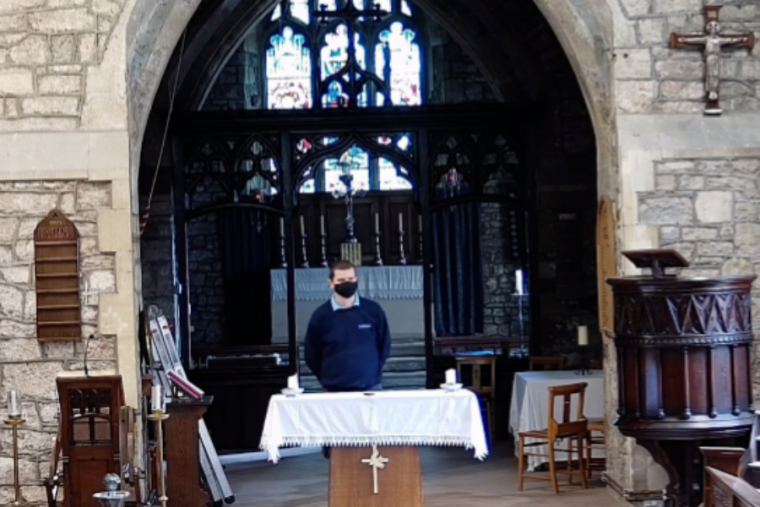Jarek Kwiatkowski of KT Electronics tests a livestream installation at a church in Wales. Photo courtesy of KT Electronics.
When Paul Fulgoni heard the news about the coronavirus pandemic spreading across Europe, he decided that his small electronics company needed to leap into action.
KT Electronics, his firm on the outskirts of the Welsh capital Cardiff, specialized in installing church audio equipment. But Fulgoni realized that churches might soon be needing more than a high-quality sound system.
“Just as the situation was getting bad, we had been thinking about livestreaming for a few months,” he told CNA.
Fulgoni, a 65-year-old whose grandparents emigrated from Italy to Wales, approached his pastor in the coastal town of Barry and asked if he could install a video camera.
“He thought about it and said: ‘Why not? By all means,’” Fulgoni recalled. “And then events overtook us. Very, very quickly we realised we were being locked down.”
Working with two colleagues, he installed cameras in four churches before the authorities imposed a nationwide lockdown March 23.
Their work earned praise from the local bishop, Archbishop George Stack of Cardiff, who recommended the firm to priests seeking to livestream Masses celebrated without a congregation.
Stack told CNA that, thanks to KT Electronics, churches had “been able to produce quite sophisticated livestreaming” during the pandemic.
Describing Fulgoni as “a very good person,” Stack said: “He’s helped many churches come up to speed.”
Fulgoni said he regarded it as “an absolute privilege” to help people remain connected to their parishes during the crisis.
“What we’re finding, talking to people and looking at the viewing figures, is that a lot of people are tuning in for Mass midweek,” he said.
“I believe that there are a lot of people who — even in the normal working week if we weren’t in lockdown — possibly wouldn’t be able to find the time to get down as far as the local church for morning Mass, but are able to make half an hour, go into a quiet room and watch Mass from home.”
Fulgoni acknowledged that there are other options for parishes, such as livestreaming Masses on Facebook via mobile phones.
“We are aware that you can get cheap equipment in. But why?” he asked. “If you’re going to do the job, do it correctly. We’ve got decent quality cameras. We pick up the sound directly off the church sound systems. And we then stream the system out. A link is put on the parish website.”
Fulgoni explained that he had entered the electronics business after a chance encounter at Mass.
“My own faith led me to install sound systems in churches,” he said. “Twenty-sixish years ago I was in Mass one evening and I said to the lady who was standing beside me that I couldn’t quite hear what the priest was saying. And she smiled and said: ‘Neither can I.’”
Fulgoni told her that he could help to improve the sound. The next day she rang him and invited him to meet the local pastor to discuss the problem.
“Had I not been in Mass that Sunday evening, the chances are that I wouldn’t be doing what I’m doing at the moment,” he said.
Although the lockdown is easing in Wales, churches remain closed with no reopening date. Fulgoni and his colleagues have returned to work on a part-time basis. They set up a camera at another parish June 11 and hope to install more in the coming weeks.
Reflecting on the future of livestreamed Masses, he said: “My feeling is that it will endure. I believe there will still be a proportion of the people who for whatever reason — very likely through infirmity — won’t be able to physically get into church. And why should they be excluded?”
“I’m humbled to think that I’m involved in this. I’m so acutely aware of what it means to many people, particularly some of the old folks who genuinely wouldn’t be able to get to Mass.”

